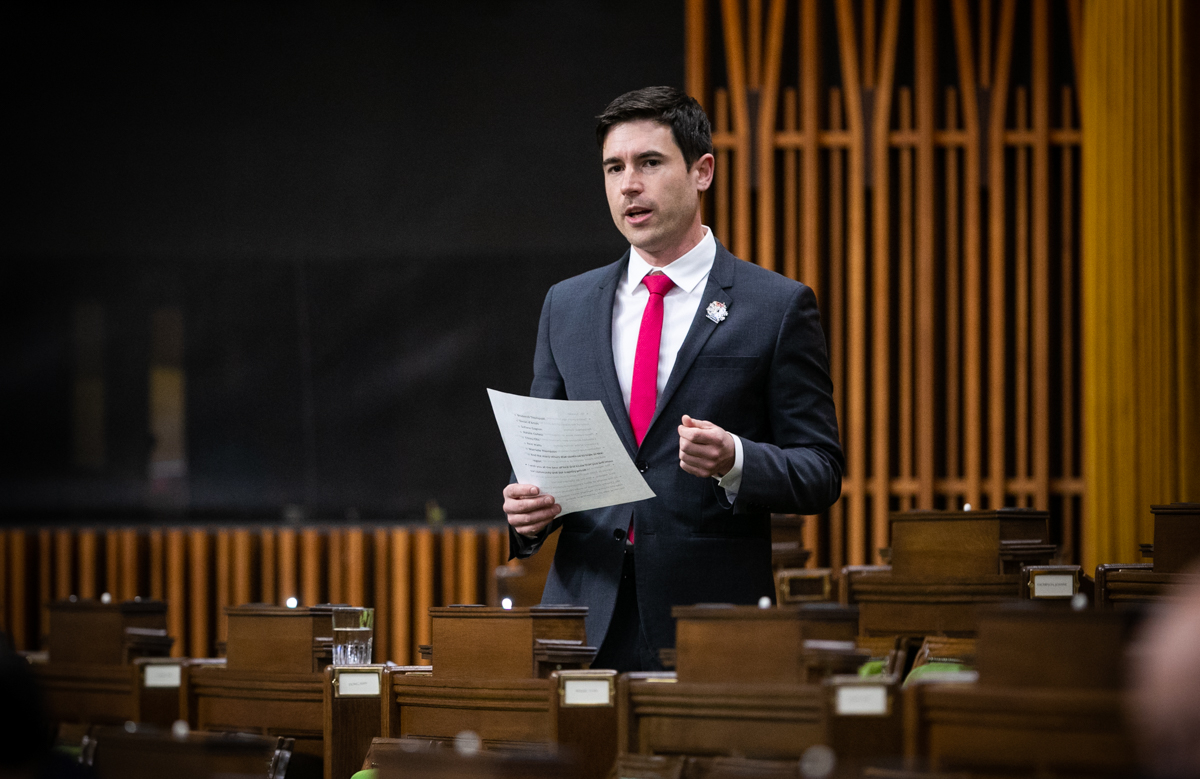Support strong Canadian climate journalism for 2025
Some MPs on the federal environment committee say a third-party review of the Alberta Energy Regulator's response to the Kearl tailings spill leaves more questions than answers.
“This doesn't help at all, this doesn't answer our questions, this is a complete waste of time,” said NDP MP Heather McPherson, a member of the standing Committee on Environment and Climate Change.
“The AER has lost the trust of these communities and is doing nothing to protect our environment,” McPherson told Canada’s National Observer in a phone interview.
Earlier this year it came to light tailings were seeping from Imperial Oil’s Kearl site in northern Alberta for nine months, and apart from one email, downstream communities were not notified. It took a massive spill of 5.3 million litres on Feb. 4 2023 for the long-term seepage — which Imperial Oil first noticed in May 2022 — to be made public through an environmental protection order, sparking outrage from Indigenous communities, the public and politicians.
McPherson was among members of the standing Committee on Environment and Climate Change who questioned Imperial Oil executives including CEO Brad Corson and Alberta Energy Regulator president and CEO Laurie Pushor, as part of a review into the spill response. When MPs put questions to Pushor on April 24, Pushor said he couldn’t answer many of them due to the third-party review taking place which would provide the answers.
Liberal and NDP MPs involved in the committee’s Kearl study were not satisfied with the report the AER board of directors commissioned Deloitte to produce.
McPherson pointed to several outstanding questions, including that MPs still don’t know if — or when — the regulator informed the federal environment minister or provincial leaders about the incidents, or how severe the seepage is.
“I find this report almost to be in contempt of Parliament, to be perfectly honest,” McPherson told Canada’s National Observer. “[Pushor] refused to answer my questions when I asked them very clearly, in a parliamentary committee, and said, ‘No, we need to wait for the report to come out,’” but the report failed to deliver, she said. McPherson thinks Pushor should be compelled to come testify again and explain the lack of answers provided by the report, but said she hasn’t yet broached the idea with her colleagues.
The report concluded the regulator followed all its policies and procedures but noted there are opportunities for improvement. That, “is the understatement of the year,” said Liberal MP Patrick Weiler in an interview with Canada’s National Observer.
“This confirms that their system was set up for failure from the beginning,” and, while it answers some questions, Weiler said it raises “a whole bunch of other ones.”
The scope of the review is limited. For example, it did not engage with Imperial Oil at all, despite the AER’s stance that the oil company was responsible for notifying affected groups about the spill, said Weiler.
“But at the end of the day the duty to the [First] nations is actually with the government not with the company itself,” said Weiler. Imperial Oil and the AER say it was a communications breakdown, but Weiler said it “goes far deeper than that,” and requires “significant changes” within the regulator.
Shortly after the April 24 hearing, MPs on the environment committee voted to invite the CEO of Imperial Oil and the Alberta Energy Regulator back to Parliament for a two-hour meeting in October 2023 to provide updates on what steps they took since April 2023 to address the issues resulting from the Kearl tailings pond seepage and spill.
These individuals are being invited back a second time because they were, particularly the Imperial Oil executives, “very evasive in their answers,” Weiler said in a Sept. 20 interview with Canada’s National Observer.
“They assured us that there was an internal investigation going on, and they would be able to say more,” said Weiler. “So we didn't want that to be the end of it, we wanted to actually hear the results of that and be able to have the appropriate accountability.”
Conservative MP and environment critic Gérard Deltell declined to comment, saying he had not yet read the full report — which was released late the previous afternoon.
Bloc Québécois MP Monique Pauzé, who sits on the federal environment committee with Deltell, also declined to comment when asked the morning of Sept. 28, having not yet read the full report yet.
Next time committee members pose questions to representatives from the AER and Imperial Oil, Weiler hopes the company and regulator will be less defensive and talk more about how to fix matters going forward.
The fact that Deloitte looked at the rules and found the Alberta energy regulator followed them all “just confirms that the energy regulator and its role is to support the industry,” said Green Party leader Elizabeth May, adding she was not surprised by the outcome. In her view, the report was designed to exonerate the regulator, which did not ensure Imperial Oil fulfilled its duty to notify affected communities. Area First Nations were alarmed to discover the seepage near the firebag River — a tributary of the Athabasca River — had been going on for nine months because people rely on the land and water for subsistence.
“The main actor here is Imperial [Oil], and they are bad actors,” she said. “They have damaged the environment and they have broken commitments to First Nations.”
“If we look at fossil fuel CEOs as a criminal element, this regulator drives the getaway car,” said May. “To pretend we have any real regulation and protection of waterways and protection of First Nations protection of the environment surrounding the oil sands” is “public relations” for industry, she said.
The AER and Imperial Oil had regular meetings throughout summer 2022 and could have brought First Nations up to speed as the seepage was being investigated, said May, referring to testimony from the committee meetings.
Athabasca Chipewyan First Nation Chief Allan Adam said he does not accept the third-party report, and made his stance clear to AER representatives the day before it was made public. “Prepare for court,” was Adam’s message to the regulator, in an interview with Canada’s National Observer.
“What we really need here is a full scale inquiry into the stability of tailings ponds,” said May, echoing the Athabasca Chipewyan First Nation and other groups’ calls for a geotechnical audit of all the oilsands tailings facilities.
Environment and Climate Change Canada enforcement officers are currently investigating Imperial Oil to determine whether the Kearl leaks and seepage broke federal fisheries law that prohibits the deposit of harmful substances into water frequented by fish or any place where the substance could feasibly enter fish-bearing waters.
Environment and Climate Change Canada did not respond by deadline to a request for updates on the investigation and a joint federal-provincial-Indigenous working group that was created to help address immediate concerns about Kearl.
Natasha Bulowski / Local Journalism Initiative / Canada’s National Observer






Comments
Please, clarify, “Oilsands spill response report gets a fail from angry MPs.”
Is this headline from 1983, 1993, 2003, 2013 or is this a speculative headline from 2043?
The youth of today would be well advised to ignore performative anger.
Anger is an emotion not an active response. People are what they do not what they say or grumble in front of cameras.
The Imperial oil leak was first noticed in May of 2022....and the major spill which alerted most of the public to the ongoing leak happened in April of 2023. Your disparaging second sentence suggests you haven't read the article, though you perhaps scanned it in order to do what many folks do if they wish to discredit a report....
They attack the language of the report instead of addressing anything the article is presenting.
Everyone who follows the news should know that this report came out sometime this year...2023...and as Elizabeth May said: The Alberta Energy Regulator drives the getaway car for the fossil fuel CEO's. In Alberta, we've known it was an industry captured regulator for years now...
And your efforts to tell the National Observer readership what Anger is........suggests you aren't bothered by industries cavalier attitude to our land and water sheds. Anger is an entirely appropriate response to the contempt Imperial Oil must have for indigenous lands.........and for the entire Alberta population that depends on clean water.
But you are certainly on the money for your conclusion: People are what they do.
My thanks to the courageous MP's who are bringing the sweetheart relationship between the Fossil Fuel Industry and the provincial regulator to the public's attention.
I hope they don't stop because you choose to call politicians doing their job grumblers.
Where can I donate to help fund the legal fees expected from the court case threatened by Chief Allan Adam?
That's a bit naive. The alt-right is in the process of transforming our politics, largely using performative anger.
It's only justifiable anger.....at the continued sweetheart deals between Big Fossil Fools and Foolish Governments that the right wing finds 'performative'.
If the Regulator is the getaway driver, elected members of the provincial government have been riding shotgun. From inadequate monitoring of Athabasca water down stream of the tar sands, to refusing to address health concerns in Fort Chip, to inadequate regulation of fracking, to the abysmal failure of o and g companies to clean up after themselves, it is provincial law which allows the criminal element mentioned by Elizabeth May to get away with abusing land water and people and walking away with huge profits.
The CBC has published a related article at https://www.cbc.ca/news/canada/edmonton/kearl-oilsands-releases-tailing… It quotes Mikisew Cree Chief Billy-Joe Tuccaro as saying, "The Alberta Utilities Commission and the Alberta government had no problem instituting a moratorium on renewable energy projects, but they won't take simple regulatory measures in the face of a known human and environmental health problem." How much more damning can you get? All of us Albertans ought to be deeply ashamed. And when we next get the chance, we need change the way we vote. And after that we need to keep up pressure on the elected officials to reform our province.